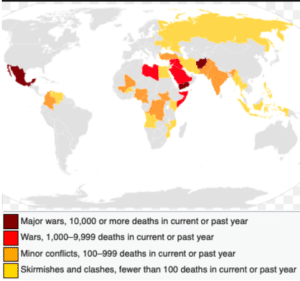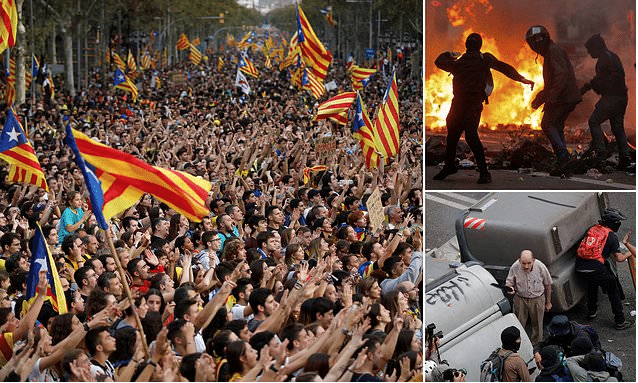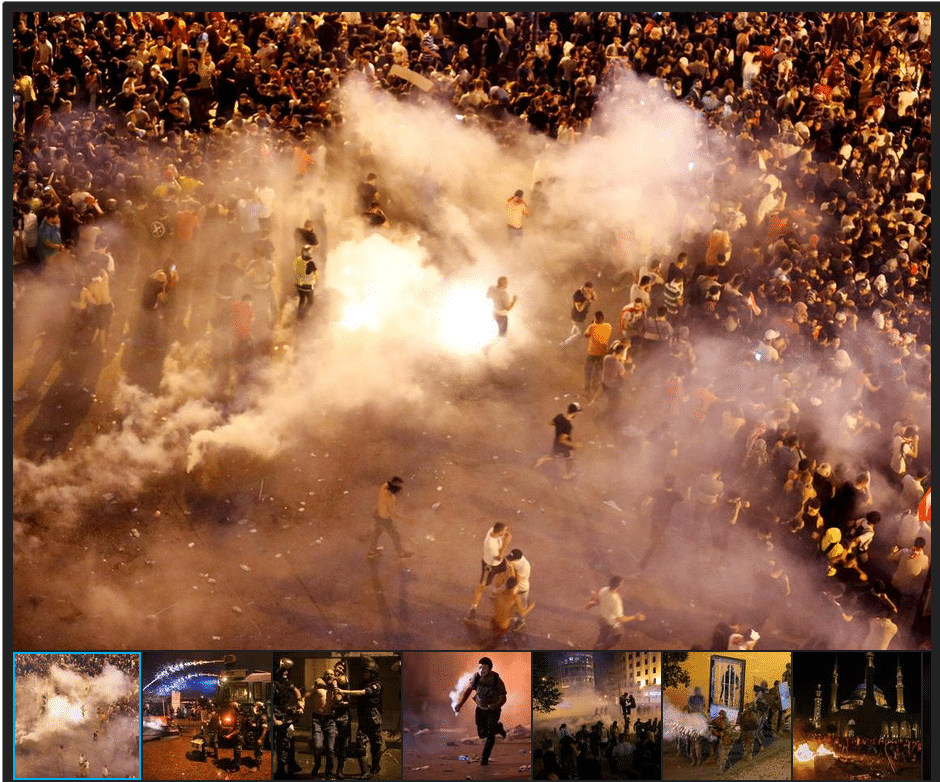I suspect many of you don’t know Catalonia from Babylonia, and couldn’t care less that you don’t. But, trust me, reading what follows will “connect” you far more than browsing social media ever could.
Catalan separatists burned barricades and clashed with police in Barcelona on Thursday in a fourth night of violence triggered by Spain’s jailing of nine of their leaders over a failed independence bid.
The fresh clashes came on the eve of a huge protest planned in the Catalan capital. Separatists have called a general strike and a rally on Friday against the Supreme Court’s decision to jail the separatist leaders for their role in a referendum banned by Madrid and a short-lived declaration of independence.
(Agence France-Presse, October 18, 2019)
I wonder why these Catalan separatists even bother. After all, it has been self-evident for years that they are fated to fail.
I know this because I’ve been commenting on Catalonia’s fight for independence from the beginning. For example, I refer you to “Catalonia: Spain’s Kosovo Problem,” October 1, 2012, “Catalonia Continues Sisyphean Climb Towards Independence,” October 2, 2017, and “Catalonia Dreamin’,” May 17, 2018.
The last of these includes the following:
____________________
My serial homage to Catalonia is replete with instructive references to separatist movements in regions like Serbia’s Kosovo, Iraq’s Kurdistan, Italy’s South Tyrol, Belgium’s Flemish and Walloon, China’s Uyghur, and even Spain’s own Basque.
But perhaps the best way to explain the ill-fated nature of Catalonia’s fight is to pose this question: What do you suppose would happen if a Texas referendum to secede from the United States passed and its legislature then proceeded to draft a new constitution and implement laws pursuant to that referendum?
The late U.S. Supreme Court Justice Antonin Scalia wrote in a 2006 letter that ‘if there was any constitutional issue resolved by the Civil War, it is that there is no right to secede.’
(PBS News Hour, May 4, 2017)
 Granted, the Spanish fought their Civil War not over secession but over national control. What’s more, their 1978 constitution codified the aspirations of regional communities for some degree of self-governing autonomy (a.k.a. “state of autonomies”). But Article 2 also resolved
Granted, the Spanish fought their Civil War not over secession but over national control. What’s more, their 1978 constitution codified the aspirations of regional communities for some degree of self-governing autonomy (a.k.a. “state of autonomies”). But Article 2 also resolved
the indissoluble unity of the Spanish nation.
This is why Catalonia has no greater chance of ever becoming independent from Spain than Texas has of becoming independent from the United States.
¡Ya basta! ¡Dejen de pelearse!
____________________
Given that, these separatists are doing little more than the proverbial cutting off nose to spite face. More to the point, like Hong Kongers trashing and burning their city, Catalans doing the same are damaging Barcelona’s economy. And both need only look to Greeks to see the aggravating effects their anarchic protests, which raged for over three weeks in December 2008, have had on them.
Meanwhile, nothing is more telling about their ill-fated aspirations than polls showing that Catalans themselves are as divided over secession as Brits are over Brexit. And, to paraphrase Abraham Lincoln’s famous warning, a (would-be) nation divided against itself cannot … form.
That said,
It was the best of times, it was the worst of times, it was the age of wisdom, it was the age of foolishness, it was the epoch of belief, it was the epoch of incredulity, it was the season of Light, it was the season of Darkness, it was the spring of hope, it was the winter of despair …
(‘A Tale of Two Cities,’ Para.1, Line, 1)
With all due respect to Dickens, that passage has never been truer than it is today. For starters, it’s not just a tale of two cities in Europe (namely London and Paris) but many around the world (from Hong Kong to Santiago and too many in between to name).
No less a triumvirate than Bill Gates, Warren Buffett, and Elon Musk will tell you these are the best of times. They note that the world on average has never been freer, healthier, richer, safer, smarter, or more innovative. And they cite “data science” – compiled by the likes of eminent thinker Steven Pinker – to prove their point.
Yet people on average seem more restive than ever. For them these are the worst of times. And, with the media covering their plight like junkies coveting drugs, we can all be forgiven for thinking the same.
To be fair, though, naysayers and doomsayers can also cite data science – not least from a more nuanced reading of Pinker’s own research – to prove their point. But reports like “World on Fire: 13 Major protests happening around the globe right now” (Business Insider, October 3) also give credence to this more pessimistic perspective.
They include
- Chileans protesting the rise in metro fares, which became the proverbial straw that broke the camel’s back of economic hardships.
- Lebanese protesting exchange rates and taxes on Whatsapp and other communication apps amid worsening economic conditions and widespread political corruption.
- Americans protesting everything from police brutality to stagnant wages and white supremacy.
- Russians protesting sweeping arrests of democratic freedom fighters.
- Iraqis (and Afghans) protesting security and economic conditions we know all too well.
- Frenchmen protesting all manner of grievances, including working conditions and environmental ravages.
- Indonesians protesting new laws that criminalize cohabitation and sex outside marriage.
- Egyptians protesting Arab Spring harvesting not democracy but (more) despotism.
- Dutchmen protesting parliamentary attempts to shut down their cattle farms to help combat climate change.
- Haitians protesting government plans to end subsidies for chronic shortages of food, oil, and power.
- (Oppressed) Palestinians protesting systemic violence at the hand of Israeli soldiers.
- Peruvians protesting attempts by established right-wing politicians to undermine the efforts of their beleaguered president to eliminate corruption.
- (Exempted) Hong-Kong Chinese protesting China’s totalitarian control (for five months now to no avail).
 Clarified hope to redress long-held grievances is the driving force behind the protests in each of these cases. But there are far too many others where all hope is lost and violence is the only driving force. Exhibit A is the protest involving the Kurds — who are seeking self-determination from Syrians and Turks. Unfortunately, as warsintheworld.com documents, similar conflicts for self-determination are raging on every continent, including
Clarified hope to redress long-held grievances is the driving force behind the protests in each of these cases. But there are far too many others where all hope is lost and violence is the only driving force. Exhibit A is the protest involving the Kurds — who are seeking self-determination from Syrians and Turks. Unfortunately, as warsintheworld.com documents, similar conflicts for self-determination are raging on every continent, including
- 30 countries in Africa
- 16 countries in Asia
- 10 countries in Europe
- 7 countries in the Middle East
- 7 countries in the Americas
Nonetheless, these really are the best of times … too. But I fully appreciate why protests and small-scale conflicts, which appear to be flaring up everywhere, give the impression that the world is on fire.
It’s clearly hard to see through the smoke screen of these protests and conflicts, which affirm every dreaded thought about man’s inhumanity to man. But, if we are patient enough to let the winds of time clear away some of that smoke, we would see that we humans have never had it so good – no matter how seemingly undeserving we may be.
Related commentaries:
Catalonia dreamin’…
Hong Kong…
Yellow vests…

